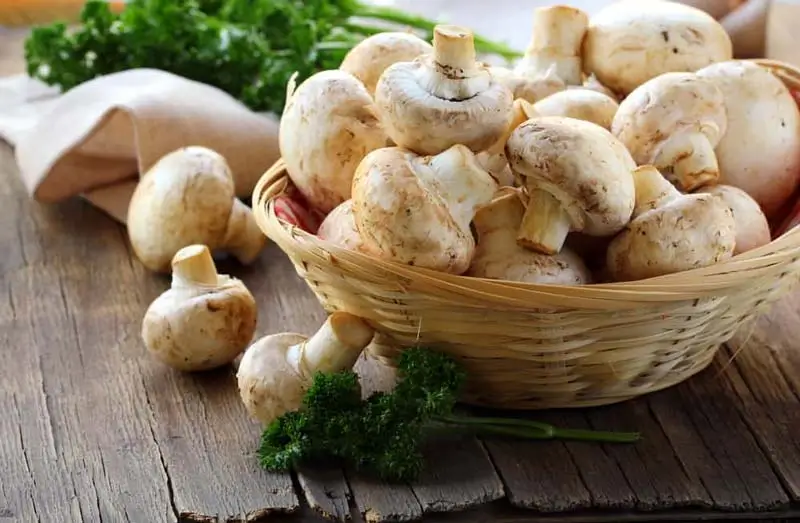Is Mushroom a Vegetable? 2025
Many people automatically categorize mushrooms as vegetables because they are commonly found in the produce section of grocery stores and used in salads, soups, and stir-fries just like vegetables. However, the truth is a bit more complex. Unlike vegetables, which come from plants, mushrooms belong to a completely different biological category called fungi.

This raises an interesting question: Is a mushroom a vegetable? To fully understand the answer, you need to explore what defines a vegetable, how mushrooms grow, and what makes them unique compared to other foods we eat. In this article, we will take a deep dive into the nature of mushrooms and whether they are vegetables or not.
What is a Vegetable?
A vegetable is a part of a plant that is safe to eat. This includes roots like carrots, stems like celery, leaves like spinach, and even flowers like broccoli. Vegetables are typically rich in vitamins, minerals, and fiber, making them a crucial part of a balanced diet. Since mushrooms are often prepared and eaten like vegetables, many assume they fall into the same category. However, to determine if mushrooms are truly vegetables, we must examine their biological classification.
What is Mushroom?
A mushroom is a type of fungus that produces a fruiting body, which is the part we commonly eat. Mushrooms come in various shapes, sizes, and colors, and they grow in different environments, including forests, fields, and even cultivated farms. Unlike plants, mushrooms do not require sunlight to grow. Instead, they feed on decaying organic matter, which makes them an essential part of nature’s recycling system.

What is Fungus?
Fungi is a group of organisms that includes mushrooms, molds, and yeasts. They belong to the Fungi Kingdom, which is separate from plants and animals. Fungi play a crucial role in ecosystems by breaking down dead organic material and recycling nutrients back into the soil.
Unlike plants, fungi do not have chlorophyll and cannot perform photosynthesis. Instead, they absorb nutrients from their surroundings. Some fungi are beneficial, such as those used in medicine and food production, while others can be harmful, causing diseases in plants and animals.
Is Mushroom a Vegetable? Continue Reading

Why aren’t Fungi Animals?
Fungi are not animals because they do not have a nervous system, muscles, or the ability to move on their own. Unlike animals, which ingest food and digest it internally, fungi absorb nutrients from their environment through a process called external digestion.
Fungi also reproduce differently from animals, using spores instead of eggs or live birth. While fungi share some characteristics with animals, such as the presence of chitin in their cell walls (a substance also found in insect exoskeletons), they are fundamentally different organisms.
Read More: Korean Corn Dogs Recipe
Why aren’t Fungi Plants?
Fungi are not plants because they do not contain chlorophyll, which is necessary for photosynthesis. Plants produce their food using sunlight, water, and carbon dioxide, while fungi obtain nutrients from organic matter.
Additionally, fungi have different cell structures than plants. Instead of cellulose-based cell walls like plants, fungi have cell walls made of chitin. These differences place fungi in their separate kingdom rather than grouping them with plants.
The Third Kingdom
Mushrooms are not plants; they are fungi. Unlike plants, fungi do not have chlorophyll, meaning they cannot make their food through photosynthesis. Instead, mushrooms absorb nutrients from decomposing organic matter, such as dead leaves and wood.
This makes them fundamentally different from vegetables, which grow from seeds and rely on sunlight to produce energy. Because of this distinction, scientists classify mushrooms under a separate kingdom known as Fungi, rather than under the Plantae kingdom where vegetables belong.
Frequently Asked Questions
Are mushrooms considered vegetables?
No, nutritionists classify mushrooms separately from vegetables because they are fungi. However, they acknowledge that mushrooms provide similar health benefits.
Can mushrooms be used as a vegetable substitute?
Yes, mushrooms are often used in place of vegetables in cooking because they have a similar texture and nutritional value.
Do mushrooms have the same vitamins as vegetables?
Mushrooms contain some of the same vitamins as vegetables, such as B vitamins and potassium, but they also have unique compounds like ergothioneine.
Are mushrooms good for a vegetarian diet?
Yes, Mushrooms are a great addition to vegetarian diets because of their meaty texture and high nutritional content.
Do mushrooms grow the same way as vegetables?
No, mushrooms grow from spores, not seeds, and they do not need sunlight to grow, unlike vegetables that rely on photosynthesis.
Are mushrooms classified as animals?
No, mushrooms are not animals because they do not have a nervous system, muscles, or the ability to move on their own. They belong to the fungi kingdom, which is separate from both plants and animals.
Conclusion
So, is a mushroom a vegetable? The answer depends on how you define the term. Scientifically, mushrooms are not vegetables because they belong to the fungi kingdom, not the plant kingdom. Unlike vegetables, they do not grow from seeds, lack chlorophyll, and absorb nutrients from organic matter rather than producing their food through photosynthesis.
However, mushrooms are often treated as vegetables because of their taste, texture, and usage in cooking. Despite their classification, mushrooms are incredibly nutritious and offer numerous health benefits similar to those of vegetables. Whether you view them as vegetables or fungi, one thing is certain: mushrooms are a delicious and healthy addition to any meal. The next time you enjoy mushrooms in your favorite dish, you can appreciate their uniqueness and nature.






